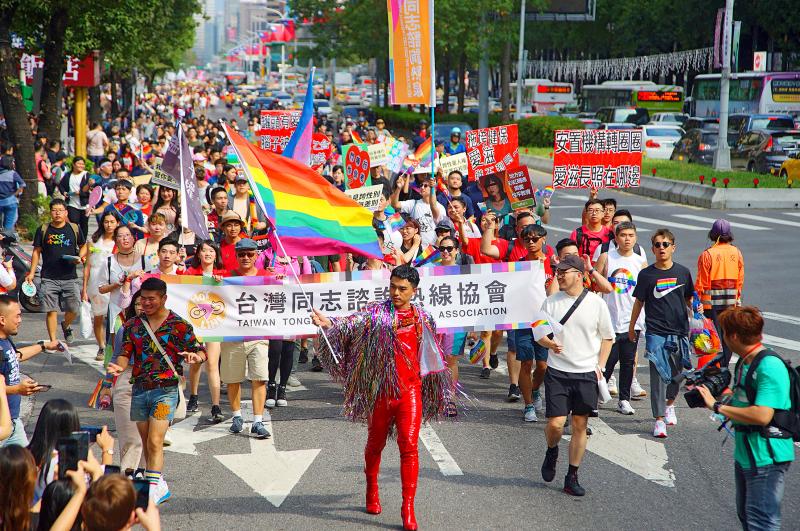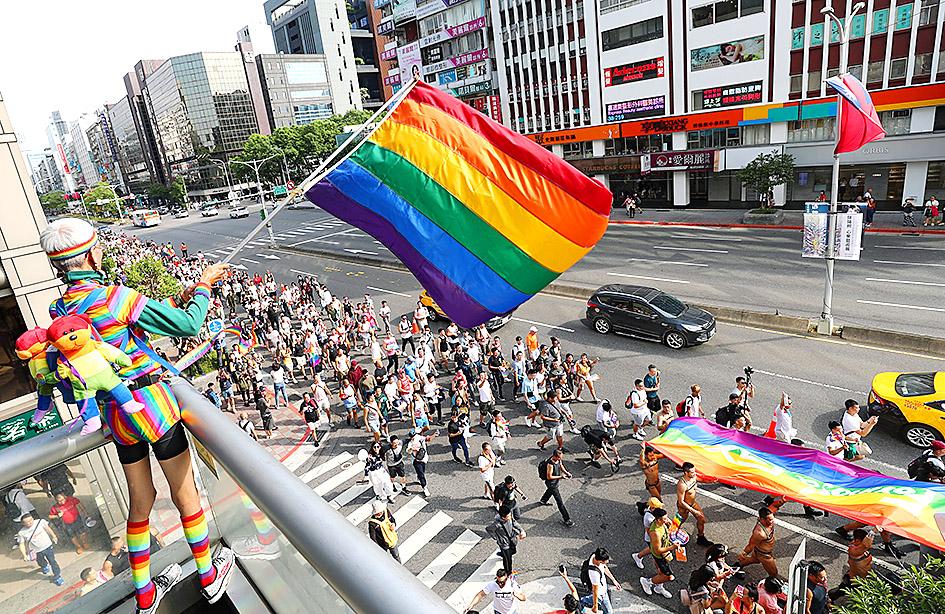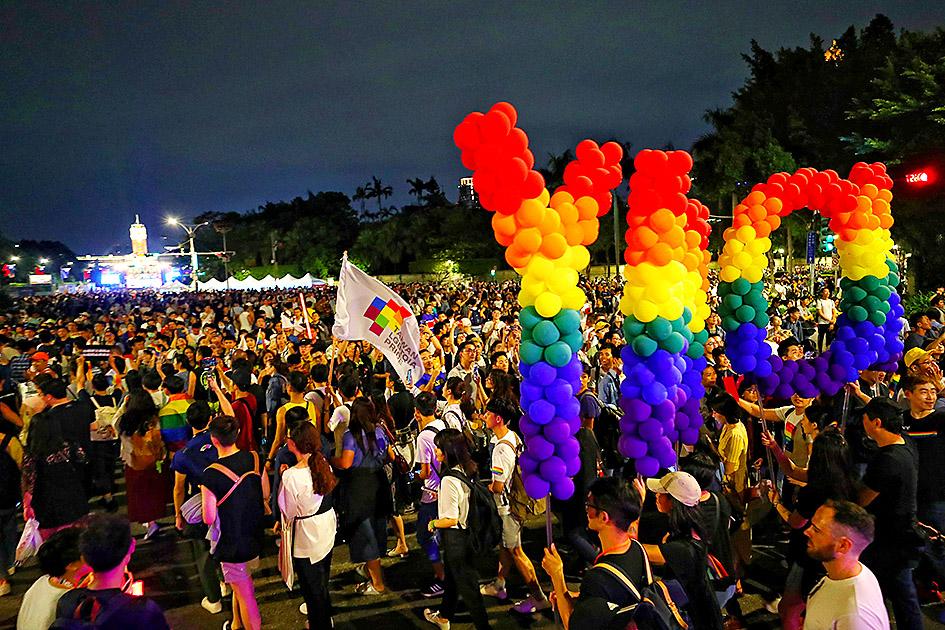Taiwan’s LGBT Pride Parade turns 18 this year.
The movement has come a long way from just wanting to be noticed in 2003 to reaching the milestone of same-sex marriage legalization in 2018, but like humans, coming of age is a major point of departure in one’s life journey.
Taiwan Rainbow Civil Action Association chairperson and parade spokesperson Shao Li-yi (邵立宜) says she is still asked whether a march is needed in this “post same-sex marriage era.”

Photo: CNA
She suggests looking at the 12 co-organizing groups — each one is still working on important issues, from removing HIV stigmas to parents supporting LGBTQ education to assisted sexual relief for disabled people and promoting workplace equality. Even same-sex marriage is far from equal, as issues regarding transnational marriage and adoption are yet to be resolved.
“Even though same-sex marriage has been legalized, these groups have not disappeared,” Shao says. “Neither have the radical anti-LGBTQ groups.”
These issues are all important, but most of all, this year’s parade calls for acceptance and respect toward those who are different, so that everyone can feel encouraged and comfortable to present themselves however they feel fit. The theme of this year’s parade, which begins at 1pm tomorrow at Taipei’s City Hall Plaza, is “Beauty, My Own Way.”

Photos: CNA
“We should be happy that we live in a diverse society — and that includes gender,” Shao says. “Besides feeling comfortable ourselves, we should help other people feel that way too.”
This identity extends to physical beauty as well, which is a problem both inside and outside the LGTBQ community. While beauty standards — especially toward women — are become increasingly homogenized, Shao says there’s also pressure within the gay community, for example, to fit into certain body categories.
Some ask why the LGBTQ community must encompass so many different identities, but according to the parade’s manifesto, this question is problematic since it essentially invalidates how people feel about themselves.

Photo: CNA
“This question confuses the concept of an ‘identity’ with the concept of ‘label,’” it states. “While a label is what we assign to other people, identity is a sense of belonging we grant ourselves ... Nobody can ‘help’ another person decide their identity. Each of us has the right to define what is normal to us based on what is most comfortable to us.”
Shao stresses that this identity can be fluid.
“If three years later I want to grow my hair out and act more feminine, that should be totally fine too,” she says.
Finally, Shao hopes that the parade — which will be livestreamed — can serve as inspiration and comfort for those in countries where parades cannot be held due to COVID-19 as well as those who are suffering from various problems due to being under lockdown.
“We want everyone to know that we are here with you, and you are welcome to join us online,” she says.

Growing up in a rural, religious community in western Canada, Kyle McCarthy loved hockey, but once he came out at 19, he quit, convinced being openly gay and an active player was untenable. So the 32-year-old says he is “very surprised” by the runaway success of Heated Rivalry, a Canadian-made series about the romance between two closeted gay players in a sport that has historically made gay men feel unwelcome. Ben Baby, the 43-year-old commissioner of the Toronto Gay Hockey Association (TGHA), calls the success of the show — which has catapulted its young lead actors to stardom -- “shocking,” and says

The 2018 nine-in-one local elections were a wild ride that no one saw coming. Entering that year, the Chinese Nationalist Party (KMT) was demoralized and in disarray — and fearing an existential crisis. By the end of the year, the party was riding high and swept most of the country in a landslide, including toppling the Democratic Progressive Party (DPP) in their Kaohsiung stronghold. Could something like that happen again on the DPP side in this year’s nine-in-one elections? The short answer is not exactly; the conditions were very specific. However, it does illustrate how swiftly every assumption early in an

Inside an ordinary-looking townhouse on a narrow road in central Kaohsiung, Tsai A-li (蔡阿李) raised her three children alone for 15 years. As far as the children knew, their father was away working in the US. They were kept in the dark for as long as possible by their mother, for the truth was perhaps too sad and unjust for their young minds to bear. The family home of White Terror victim Ko Chi-hua (柯旗化) is now open to the public. Admission is free and it is just a short walk from the Kaohsiung train station. Walk two blocks south along Jhongshan

Jan. 19 to Jan. 25 In 1933, an all-star team of musicians and lyricists began shaping a new sound. The person who brought them together was Chen Chun-yu (陳君玉), head of Columbia Records’ arts department. Tasked with creating Taiwanese “pop music,” they released hit after hit that year, with Chen contributing lyrics to several of the songs himself. Many figures from that group, including composer Teng Yu-hsien (鄧雨賢), vocalist Chun-chun (純純, Sun-sun in Taiwanese) and lyricist Lee Lin-chiu (李臨秋) remain well-known today, particularly for the famous classic Longing for the Spring Breeze (望春風). Chen, however, is not a name